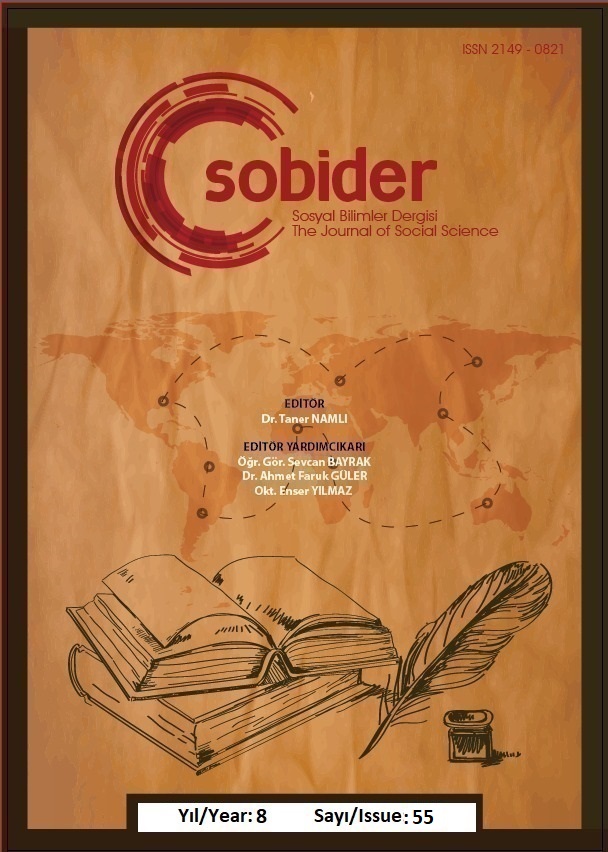Author :
Abstract
Dinî-tasavvufi Türk geleneği içerisinde varlığını sürdüren tasavvuf müziği, İslam yaşantısının kültürel bir sembolüdür. Kültürün mihenk taşları ise âlimler, zahitler, sufiler, mutasavvıflar, ulemalar ve tasavvuf müntesibi şairlerdir. Bu kimseler, lisan-ı hâllerini yansıtırken tasavvuf müziğinin menşei olan şiir ve musikiyi kaynak edinmişlerdir. Manevi duygulara tercümanlık eden şiir ve musiki; tekke, zaviye ve dergâh gibi mekânlarda vücut bulmuştur. İbadete hizmet eden bu mekânlar, yüzyıllar boyunca Anadolu topraklarında kültürel zenginliğin yaşatıldığı yerler olarak da var olmuştur.
Anadolu, geçmişten günümüze tasavvuf geleneği içerisinde dinî-tasavvufi müziğin yaşam bulduğu önemli bir merkezdir. Bu merkezin önemli bir alanını da tasavvuf müziğiyle dikkatleri üzerinde toplayan Harput/Elazığ tasavvuf müziği kaplamaktadır. Tekke musikisinin merkezlerinden olan Elazığ, tasavvuf dünyasında adından söz ettiren pek çok önemli şahsiyete ev sahipliği yapmış bu vesileyle de değinmiş olduğumuz müziğe dair kendi üslubunu meydana getirmiştir. Bölgede icra edilen ilahiler, kulaktan kulağa aktarılarak günümüze kadar ulaşabilmiştir ancak günümüzde gerek tasavvuf kültürüne has yaşam tarzının kaybolması gerekse de meşk uygulamasının azalması gibi etkenlerden dolayı eserler unutulmaya yüz tutmuştur.
Çalışmadaki amaç, derleme yöntem ve teknikleri ile transkripsiyonunu yaptığımız Elazığ’a ait “Aşkın Meyine Ben Kana Geldim” adlı ilahinin tasavvuf musikisi repertuvarındaki yerini korumaktır. Bu gayede notaya alınan eserin güftesindeki mana ve ezgisindeki nazari durum gözetilerek incelemedeki usuller belirlenmiştir. Çalışmayla yörenin tasavvuf müziğindeki varlığının korunmasına ve yaşatılmasına ışık tutulacağı düşünülmektedir.
Keywords
Abstract
The ongoing mysticism program within the religious-mystical Turkish system is a possibility of making Islam. The cornerstones of culture are scholars, ascetics, sufis, ulama and sufi followers. While reflecting their language, these people took poetry and music, which are the origins of sufi music, as sources. Poetry and music that interpret spiritual feelings; ıt came into being in places such as dervish lodges, lodges and dervish lodges. These places, which serve for worship, have also existed as places where cultural richness is kept alive in Anatolian lands for centuries.
Anatolia is an important center where religious-mystical music comes to life within the tradition of mysticism from past to present. Harput/Elazig sufi music, which attracts attention with its sufi music, covers an important area of this center. Elazig, one of the centers of lodge music, has hosted many important figures who made a name for themselves in the world of Sufism, and on this occasion, it has created its own style for the music we have mentioned. The hymns performed in the region have survived to the present day by being transmitted from ear to ear, but today the works have been forgotten due to factors such as the loss of the life style specific to the sufi culture and the decrease in the practice.
The aim of the study is to preserve the place of the hymn called “I am thirsty of the wine of love”, which we have transcribed with compilation methods and techniques, in the repertoire of sufi music. For this purpose, the methods in the study were determined by considering the meaning in the lyrics of the work that was notated and the theoretical situation in its melody. It is thought that the study will shed light on the preservation and survival of the existence of the region in sufi music.
Keywords
- Ak, A. Ş. (2016). Türk Din Mûsikîsi, Akçağ Yayınları, Ankara.
- Akdoğu, O. (1993). Türk Mûsıkîsi Nazariyatı Dersleri, Ofset Repromat, Ankara.
- Akdoğu, O. (1996). Türk Müziği’nde Türler ve Biçimler, Ege Üniversitesi Basımevi, İzmir. Artun, E. (2002). Dinî-Tasavvufî Halk Edebiyatı, Akçağ Yayınları, Ankara.
- Aydoğmuş, G. (1998). Harput Kültüründe Din Âlimleri, Çağ Ofset Matbaacılık, Elazığ. Kaplan, Z. (1991). Dinî Musikî, Millî Eğitim Basımevi, İstanbul.
- Kara, M. (2011). Tekke Maddesi XL. Cilt, TDV İslâm Ansiklopedisi, İstanbul.
- Karadeniz, M. E. (1979). Türk Mûsikîsinin Nazariye ve Esasları, Türk İş Bankası Kültür Yayınları, Ankara.
- Kaya, D. (2010). Ansiklopedik Türk Halk Edebiyatı Terimleri Sözlüğü, Akçağ Yayınları, Ankara.
- Kıvak, B. C. (2019). “Transkripsiyon Sanatına Genel Bir Bakış ve Sergey Rahmaninov’un BuAlandaki Yapıtlarının İncelenmesi”, Sanatta Yeterlilik Tezi, Anadolu Üniversitesi Güzel Sanatlar Enstitüsü, Eskişehir.
- Özkan İ. H. (2006). Türk Mûsikîsi Nazariyatı ve Usulleri - Kudüm Velveleleri, Ötüken Neşriyat A.Ş., İstanbul.
- Say, A. (2001). Müziğin Kitabı, Müzik Ansiklopedisi Yayınları, Ankara.
- Tanrıkorur, C. (2016). Osmanlı Dönemi Türk Mûsikîsi, Dergâh Yayınları, İstanbul. Tatçı, M. (2018). Niyâzî-i Mısrî Dîvânı Şerhi, H Yayınları, İstanbul.
- Uludağ, S. (2016). Tasavvuf Terimleri Sözlüğü, Kabalcı Yayıncılık, İstanbul.
- Yapıcı, S. (2015). Harput Âlim-Müellif ve Mutasavvıfları, I.-II. Cilt, Anıl Grup Matbaacılık Yayıncılık, Ankara.
- Yardımcı, M. (2013). Başlangıçtan Günümüze Türk Halk Şiiri, Kanyılmaz Matbacılık, İzmir.
- Yavaşça, A. (2002). Türk Mûsıkîsi’nde Kompozisyon ve Beste Biçimleri, Türk Kültürüne Hizmet Vakfı, İstanbul.
- Adı Soyadı/Doğum Yeri-Tarihi/Mesleği/Derlenme Yer/Derlenme Tarihi Bilal Özen/Elazığ-1971/Öğretmen/Elazığ/11-10-2021





